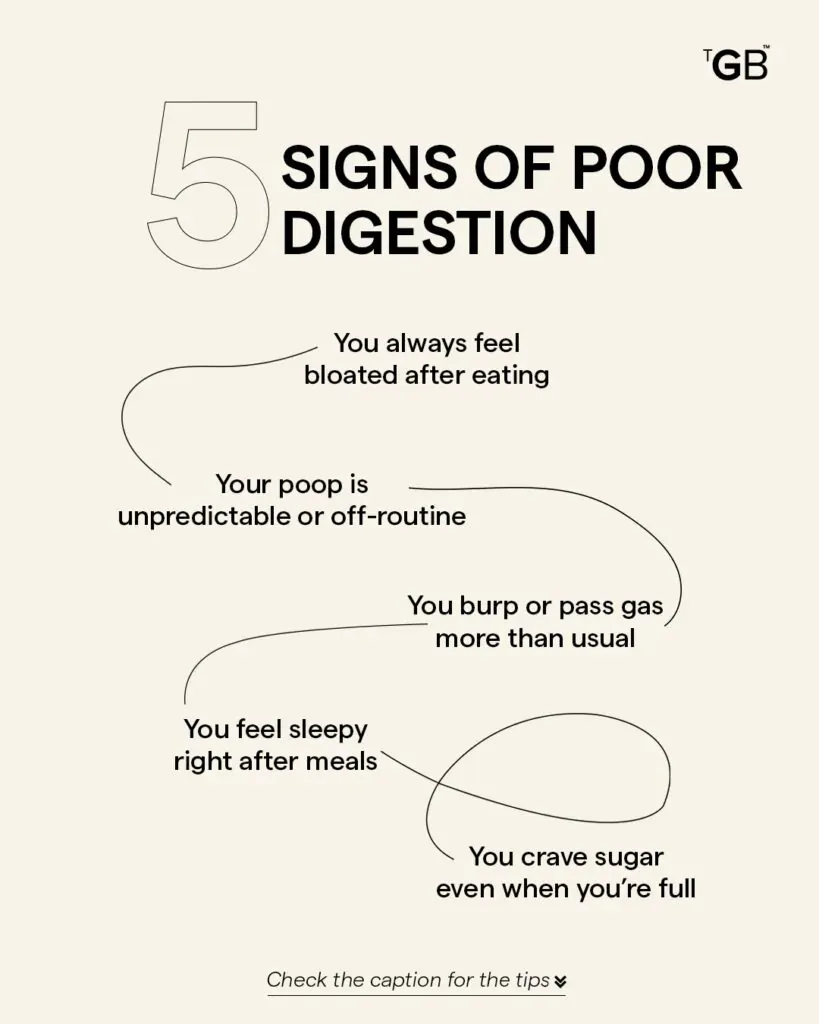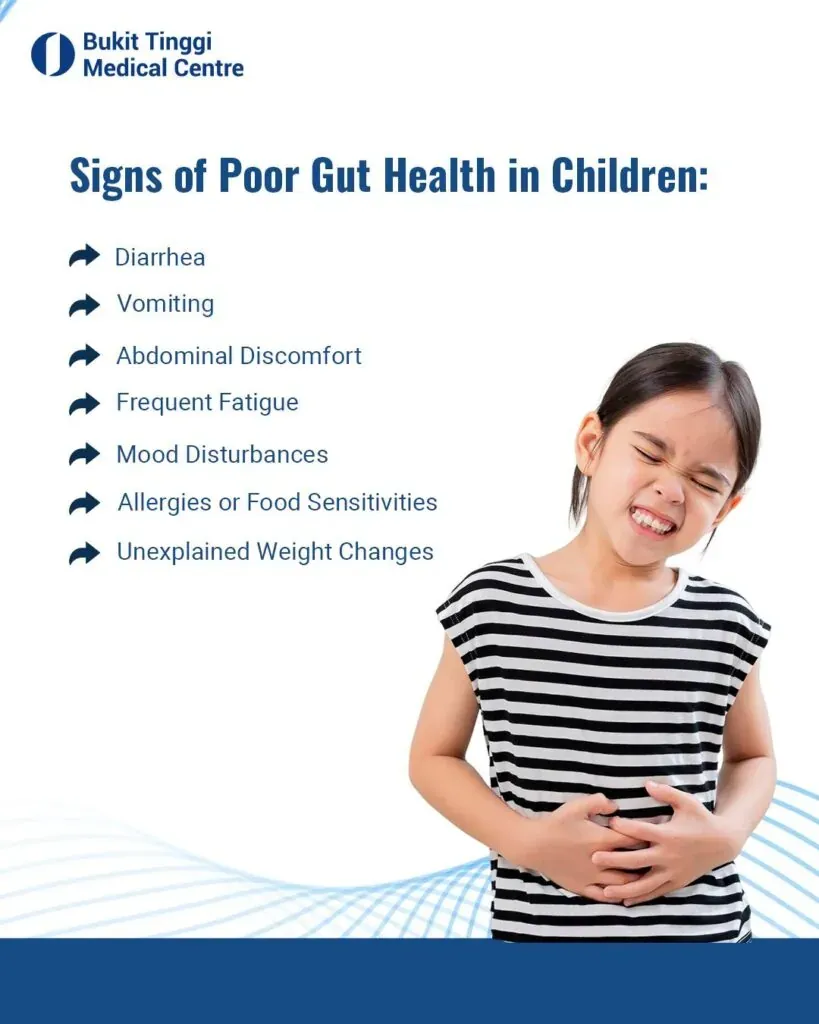Signs of Bad Gut Health – What to Look For
Symptoms or Signs of Bad Gut Health – An imbalanced gut doesn’t merely impact digestion; it also has a downstream effect on immunity and mood; therefore, manifestations of a poorly functioning gut can come in many forms. The most prevalent ones as digestive discomforts, such as bloating, gas, constipation, diarrhea, or heartburn. Frequently, these symptoms are a sign of an imbalance in the gut flora or a digestive issue. Another common symptom of gut health issues is frequent illness or infection, as a compromised immune system is often linked to gut health.

Unexplained fatigue is another one, considering an imbalanced gut may impact nutrient absorption and energy. An unhealthy gut lining or bacterial imbalance can lead to food intolerances or sensitivities, particularly to dairy, gluten, or specific carbohydrates. Through the gut-brain connection, mood disorders like anxiety, depression, or irritability can increasingly be associated with gut health.
Conversely, skin problems such as eczema, acne, rosacea, and halitosis may also be attributed to gut health. And unexplained weight changes — such as weight gain without a change in diet, or weight loss, or both — can mirror imbalances along the gut. If your health is already showing some of these signs, catching them quickly and curing your gut with diet, probiotics, hydration, and stress streamlining can be surprisingly rewarding.
Signs and Symptoms of Poor Gut Health
Frequent Digestive Issues
- If you frequently find yourself dealing with bloating, constipation, diarrhea, or excessive gas, your gut microbiome may be out of balance and having trouble breaking down and absorbing nutrients.
Unexplained Weight Fluctuations
- Weight instability (sudden weight gain or loss when you are not changing your diet or physical activities) can also show gut issues, as a dysfunctional intestinal barrier can limit the absorption of nutrients leading to an imbalance in fat storage and hunger regulation.
Constant Fatigue or Poor Sleep
- Feeling fatigued even when you have slept enough could be due to a disrupted serotonin production (hormone necessary for a healthy sleep cycle and mood) related to poor gut health.
Frequent Infections or Weak Immunity
- As a lot of the immune system is stored within the gut, many people suffer from the common cold frequently as a result of their gut microbiome is weak, failing to battle infectious bacteria or viruses.
Skin Problems Like Acne or Eczema
- Skin flare-ups like acne, rashes, or eczema are usually a sign your gut has been inflamed, and when the gut is imbalanced, toxins often come out through the skin.
Persistent Food Intolerances
- Being unable to properly digest some foods, such as dairy, gluten or suga,r may be a sign that your gut bacteria diversity is low and thus you are less able to break down these types of nutrients.
Thought Confusion, Panic or Upsetting Feelings
- The gut-brain connection makes it so that poor gut health can make it complicated to produce neurotransmitters that can lead to an inability to concentrate, irritability, anxiety, or even depression.
Halitosis (Bad Breath) and Poor Oral Health
- A dysfunctional gut can lead to halitosis, as the evil and foul-smelling bacteria in the digestive tract can produce bad breath smells and these can also affect the balance of bacteria in the mouth.
Frequent Sugar Cravings
- When sugar (and refined foods) are not feeding your system, they may continue to give you cravings simply because they have a more dominant system (overgrown bacteria or yeast are sugar addicts, feeding off of your food, one more reason to eat it).
Chronic Inflammation and Joint Pain
- If the gut is unhealthy, these substances are able to leak into the bloodstream, causing systemic inflammation, which could explain body aches and joint pain.

Signs of Poor Gut Health in Kids
As children’s undeveloped immune systems, moods, and growth are all connected to healthy digestion, this can lead to obvious physical and behavioral signs of poor gut health. Some common signs include:
- An Unbalanced Gut: Recurring bloating, constipation, diarrhea, gas, or stomach pain are signs that something is out of balance in their digestive system.
- Food Intolerances or Sensitivities: This is one of the most common signs that the gut microbiome has an inability to properly digest certain foods, such as dairy or gluten.
- Immune Dysfunction: Children with an unhealthy gut may experience recurrent colds or infections or take longer to recover from illnesses, since much of immunity resides in the gut.
- Skin Issues: Such as Eczema, Rashes, or Unexplained Breakouts that Can be Related to Inflammation and a Disturbed Gut.
- Unwellness or Low Vitality Unexplained Fatigue: A poorly functioning gut may hinder nutrient absorption, leading to exhaustion or low energy in children even after adequate sleep.
- Mood Swings or Irritability: As your gut and brain are interlinked, if your gut health is not good, it can cause anxiety, irritability, trouble concentrating, or a change in behavior.
- Unhealthy cravings: Craving sweets or processed food constantly to indicate the gut can allow bacteria or yeast to flourish.
When the gut is not absorbing nutrients right way, it can stifle a child’s growth or cognitive development.
What are the signs of poor Gut Health in dogs?
A: Some symptoms of one (or multiple) gut health issues in dogs may include diarrhea and/or constipation, excessive gas, vomiting, bloating, foul-smelling stool, bad breath, inappetence, increased trichomanes or other skin issues, decreased energy, etc. With their gut being crucial to their health and immunity, behavioral changes like irritability or lethargy may also surface.
What are the signs of poor Gut Health?
A: In people, impaired gut health is commonly indicated by bloating, gas, constipation, diarrhea, heartburn, food intolerances, tiredness, skin issues such as eczema or acne, too many illnesses due to a weakened immune system, state of mind changes like stress and anxiety or anxiety, and unexplained changes in weight.
What are the best foods for Gut Health?
1) Probiotic foods: Foods rich in probiotics like yogurt, kefir, natural probiotic shakes, sauerkraut, kimchi, and kombucha are great gut-friendly food options, as they positively modulate gut microbiota composition.
2) Prebiotic foods: Foods rich in prebiotics, such as garlic, onions, bananas, asparagus, and oats provide the necessary nutrients for gut microbiota, especially beneficial bacteria.
3) Fiber-rich fruits and vegetables: High-fiber fruits and vegetables such as apples, leafy greens, and berries should be included.
4) Foods with resistant starch: Whole grains or legumes (beans or lentils), including those that are cooked and dried
5) Healthy fats: Avocados, California prunes, nuts, and olive oil are foods rich in fat that also support gut lining health.
What alcohol is good for Gut Health
A: Although alcohol positively impacts gut health, moderation is still key because alcohol systematically disrupts gut health. Small amounts of red wine may also be advantageous because it carries polyphenols and antioxidants that feed the good bacteria in your gut. Kombucha (low-alcoholic fermented tea): Another probiotic-rich choice that also helps support gut health
When to Eat Yogurt for Gut Health
A: The optimal time to consume yogurt is in the morning for breakfast or as a fat-free snack during the day, since during this time, good bacteria are seeded in the gut. The yogurt then arrives in the intestines, where the probiotics can do their most important work, unharmed by stomach acid, which can be strong after a big meal.
When to eat sauerkraut for Gut Health
A: Sauerkraut is best consumed before a meal or together with a meal, as the probiotics prepare your digestive system and help absorb nutrients. Nougat or Honey —these provide continuous aid without weighing down your stomach too much; however, do take small doses, particularly before lunch or dinner.
When to Eat Kimchi for Gut Health
A: Germans eat kimchi mostly for lunch or the evening meal because kimchi is not only good for our digestive system but also provides probiotic supplements along with fiber and antioxidants. It helps your intestinal flora and minimizes digestive problems when consumed frequently in low amounts.
